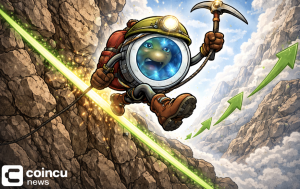Key Points:
- The Worldcoin initiative announced a $115 million venture capital round.
- Worldcoin has faced a barrage of criticism for a variety of reasons, the most serious of which is that biometric scanning creates a privacy risk.
- Individuals interested in purchasing WLD must wait until the Worldcoin mainnet opens and must be situated in a jurisdiction where the token is accessible.
OpenAI CEO Sam Altman’s Worldcoin, one of the most contentious initiatives right now, is a hybrid of biometrics, hardware, artificial intelligence, and AI. The Orb, a unique imaging gadget that validates identity and gives access to the global market, is at the heart of the issue.

When a person uses the device to verify their identity, they are given a World ID that may be used to access websites, applications, and other services without disclosing any personal information, like as emails or names.
Leading investors, including as Blockchain Capital, Bain Capital Crypto, and others, contributed $115 million to the Series C fundraising round. This comes at a time when the globe is experiencing a lack of investment owing to economic uncertainty, which is an excellent outcome for the Worldcoin team. So is Worldcoin worth our bet or not? Let’s find the answer with Coincu through this article.
New effects from Proof of Personhood
Worldcoin is likely one of the most ambitious and genuine endeavors, with the objective of introducing cryptocurrencies to over a billion people.
Worldcoin has the potential to become the biggest crypto entry, accompanied by the most commonly used crypto wallet, and, most significantly, it will introduce a new idea for the Internet – Proof of Personhood – by adopting an innovative distribution technique.
Personal identification is particularly valuable for differentiating people from bots on the Internet, given recent improvements in artificial intelligence. More on it in a moment.
Surprisingly, it’s working: despite having a very small presence and little promotion in early testing, Worldcoin managed to enroll approximately 2 million individuals. And that’s only the beginning: co-founders Sam Altman and Alex Blania are working hard to expand it to the whole world’s population.
How does it work?
In the past, protocol contributors did a bad job of disseminating their stories. Our immediate response to Worldcoin, like most people’s, was negative. At first appearance, it seems to be an Orwellian blend of hardware, biometrics, and encryption – not for the faint of heart.
Worldcoin scans each user’s iris to register and authenticate them (the colored part that surrounds the pupil). This scan confirms that the person is a genuine, alive, and distinct individual. Scanning is carried out using a unique hardware device known as an “orb.”
When it comes to biometrics, there are many reasons to be wary and sensitive, particularly when encryption is involved. Several science fiction films and books even contain the notion of “eyeball harvesting.” As a result, a dystopian viewpoint swiftly emerged.
Internally, however, the orb captures a photo of the iris, and the gadget then produces a unique code for the randomness of the iris code. By default, raw biometric data is quickly deleted, leaving just the iris code in the orb.
Verified users are assigned a World ID in TFH’s World App, the first wallet in the Worldcoin ecosystem, enabling them to discreetly verify to whomever they want that they are truly unique individuals. These on-chain identification assurances are completely safe cryptographically. Even if iris codes were reversible, there would be no way to trace individual users or know how they utilized World ID.

Values are not clearly defined
Yet, it is unclear how the Worldcoin token can be supposed to have any value for receivers after it circulates, which is only one of several lacking premises around Worldcoin.
In other words, World ID is a privacy-preserving identification technology that does not collect or retain biometric information from anybody.
As part of the process, users may also establish their own crypto wallets inside the World App. Considering World ID’s Sybil resilience, World App is the world’s first self-hosted wallet with a known user base – all other wallets depend on guessing for metrics like DAU/MAU at best.
At first look, it may be difficult to see the usefulness of a proof-of-person protocol. This is a fundamental fact for “category creators”: as a novel primitive, quantifying the usefulness and worth of personal proof at an early stage is challenging.
As a result, it is simple to conclude that the project’s UBI component is only window dressing for its true goal: addressing the issue of digital identification. Yet, Worldcoin’s response to the issue is as dreadful, creating a dizzying variety of privacy dangers and moral entanglements.
At the highest level, it’s clear to see how, given recent developments in AI, distinguishing humans from bots on the internet will become more difficult and vital.
More particularly, we may identify applications that are clearly useful now. Airdrops are one such option in Web3: numerous token-based companies seek to reward each unique user with tokens (such as for signing up, making a transaction, or any other unique behavior that token-based projects want to incentivize).
Sadly, distinguishing between distinct users is challenging. As a sybil protection measure, certain projects may demand users to give government-issued IDs; nevertheless, this has the following drawbacks:
- Eliminates more than half of the world’s population due to a lack of appropriate IDs;
- Significantly increases friction;
- Given the facts Given a lengthy history of security breaches, many consumers are understandably hesitant to provide such information. As a consequence, awards meant for unique users were disproportionately allocated to persons who Sybil hacked the process and created dozens of wallets in order to receive enormous sums of free prizes.
To reward distinct users, airdrop issuers might enhance their airdrop criteria using World ID as a proof-of-person technique. It’s difficult to see how what amounts to an Ethereum-based meme currency with no discernible tokenomic basis will be exchangeable for necessities like food and housing in the long run.
This paradox is only one example of Worldcoin’s deviously illogical motte-and-bailey language. The company’s message goes to considerable pains to portray both a philanthropic initiative and a lucrative opportunity.
Yet the use of personal identification extends well beyond cryptography. To identify people from “bots,” Internet businesses have created a considerable degree of friction, which we’ve all become so used to that we rarely notice.

Should we bet on WLD?
Although the emergence of AI has several potential advantages, current improvements (in AI) make it impossible to discern between AI and humans on the internet, and humans may soon find themselves at a significant disadvantage.
“Worldcoin is an open-source protocol, supported by a global community of developers, individuals, economists and technologists committed to expanding participation in, and access to, the global economy”, the project website reads.
These are the statements of The Worldcoin Foundation, the organization behind the innovative iris biometric cryptocurrency Worldcoin (WLD).
A personal proof protocol like World ID may enhance user experience, maintain current online services economically viable, open up the design space for future web services, and give a mechanism to promote confidence in the digital community by giving the tools to clearly discern bots from people. A privacy-preserving identity-proof system, we think, will become an essential component of the Internet. World ID, in particular, enables people to validate their humanity online while staying anonymous thanks to zero-knowledge proofs. To sign a transaction, just click a button to verify it.
WLD will be supplied worldwide and freely to everyone for both utility and future governance, just for being a unique person.
Meanwhile, the World App allows users to make worldwide payments, purchases, and transfers using WLD, other digital assets, and conventional currencies.
Anyone looking to purchase WLD must wait till the Worldcoin mainnet opens and be situated in a jurisdiction where the token is accessible (there are currently no plans to launch WLD in the US).
Although there are privacy issues regarding Worldcoin’s centralized biometric ID credentials, and rumors of a black market for ID credentials have already emerged, demand for decentralized forms of human verification is projected to expand in an increasingly AI-dominated society.
Moreover, given the strong support the Worldcoin initiative has gotten from venture capitalist Andreessen Horowitz and OpenAI CEO Sam Altman, the project is anticipated to succeed. That implies its WLD might blow up.
However, since WLD is not accessible for trade (it can only be obtained by signing up for the app and completing the humanness check), crypto investors could examine alternative tokens riding the AI wave.
Conclusion
Sam Altman, co-founder, and CEO of OpenAI, presents a unique viewpoint from the bleeding edge of AI. Maybe most crucially, Sam brought in proven expertise to assist them in accomplishing TFH’s lofty goals.
Nevertheless, Worldcoin has faced criticism for a number of reasons, the most serious of which is that biometric scanning raises privacy threats. According to a part of its website devoted to answering questions about the orb, the business will not keep iris scans, and the gadget will not harm users’ eyes.
Finally, with the appropriate technology, people, and timing, TFH has a unique chance to extend the Internet’s privacy-preserving identity principles — and in doing so, Worldcoin may become the largest entrance into the crypto market, and World App may become the most widely used crypto wallet.
DISCLAIMER: The information on this website is provided as general market commentary and does not constitute investment advice. We encourage you to do your own research before investing.
Join us to keep track of news: https://linktr.ee/coincu
Harold
Coincu News













